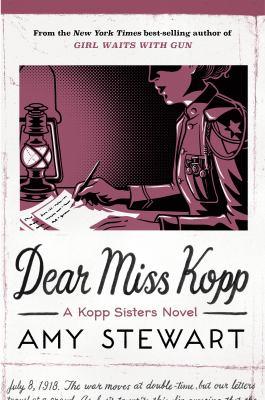
Dear Miss Kopp
The U.S. has finally entered World War I. Constance, the oldest of the Kopp sisters, is doing intelligence work on the home front for the Bureau of Investigation while youngest sister and aspiring actress, Fleurette, travels across the country entertaining troops with song and dance. Meanwhile, at an undisclosed location in France, Norma oversees her thwarted pigeon project for the Army Signal Corps. When her roommate, a nurse at the American field hospital, is accused of stealing essential medical supplies, the intrepid Norma is on the case to find the true culprit. Determined to maintain their sometimes-scratchy family bonds across the miles, the far-flung sisters try to keep each other in their lives. But the world has irrevocably changed-when will the sisters be together again? Told through letters, Dear Miss Kopp weaves the stories of real-life women a century ago, proving once again that “any novel that features the Kopp sisters is going to be a riotous, unforgettable adventure” -- Amazon.
Available Copies by Location
| Location | |
|---|---|
| Community Centre | Available |
Browse Related Items
- ISBN: 9780358093107
- ISBN: 9780358093121
- Physical Description 320 pages ; 21 cm.
- Publisher Boston : Houghton Mifflin Harcourt, 2020.
Series
Additional Information



